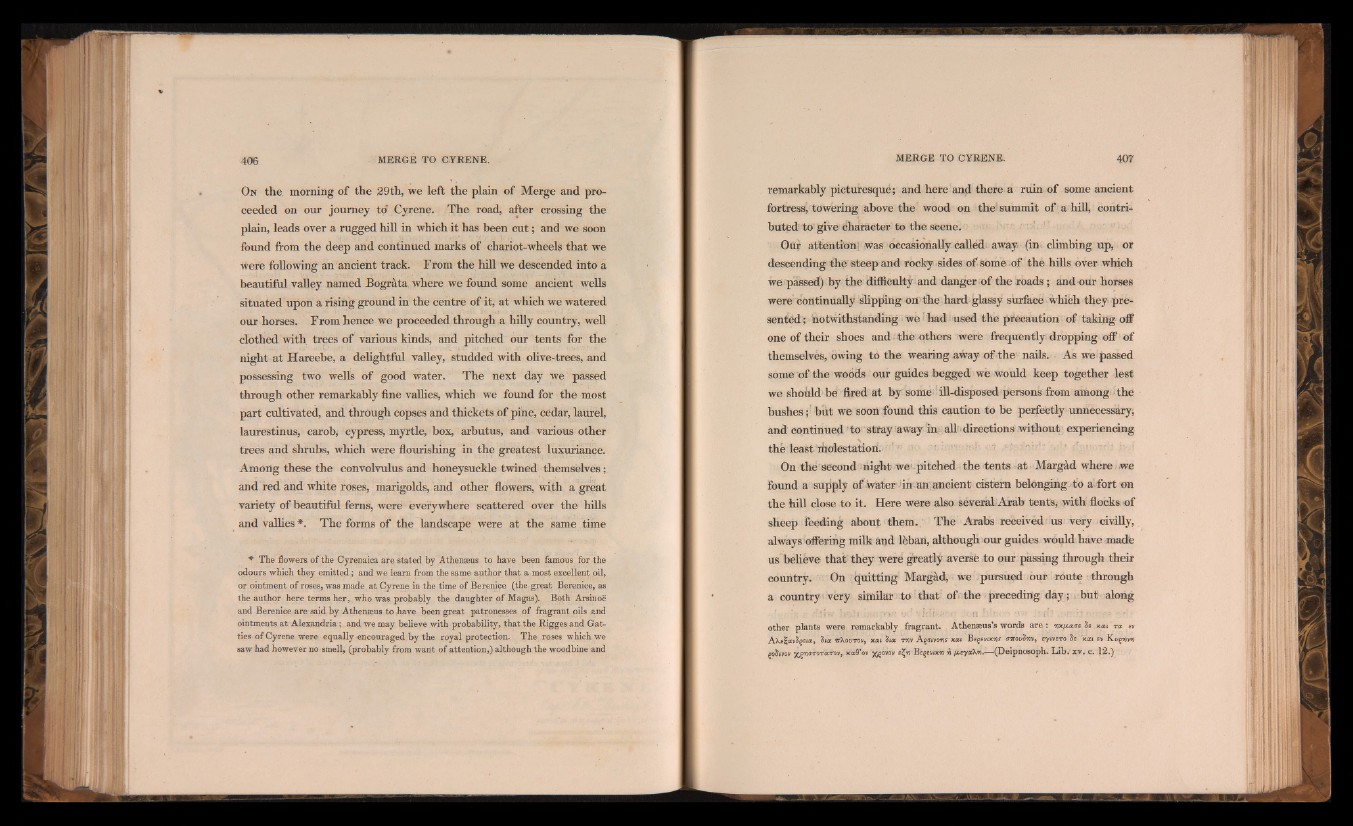
O n the. morning of the 29th, we left the plain of Merge and proceeded
on our journey to Cyrene. The road, after crossing the
plain, leads over a rugged hill in which it has been cu t; and we soon
found from the deep and continued marks of chariot-wheels that we
were following an ancient track. From the hill we descended into a
beautiful valley named JBograta where we found some ancient wells
situated upon a rising ground in the centre of it, at which we watered
our horses. From hence we proceeded through a hilly country, well
clothed with trees of various kinds, and pitched our tents for the
night at Hareebe, a delightful valley, studded with olive-trees, and
possessing two wells of good water. The next day we passed
through other remarkably fine vallies, which we found for the most
part cultivated, and through copses and thickets of pine, cedar, laurel,
laurestinus, carob, cypress, myrtle, box, arbutus, and various other
trees and shrubs, which were flourishing in the greatest luxuriance.
Among these the convolvulus and honeysuckle twined themselves;
and red and white roses, marigolds, and other flowers, with a great
variety of beautifid ferns, were everywhere scattered over the hills
and vallies *. The forms of the landscape were at the same time
* The flowers of the Cyrenaica are stated by Athenaeus to have been famous for the
odours which they emitted; and we learn from the same author that a most excellent oil,
or ointment of roses, was made a t Cyrene in the time of Berenice (the great Berenice, as
the author here terms her, who was probably the daughter of Magas). Both Arsinoe
and Berenice are said by Athenaeus to have been great patronesses of fragrant .oils and
ointments a t Alexandria; and we may believe with probability, th a t the Rigges and Gat-
ties of Cyrene were equally encouraged by the royal protection. The roses which we
saw had however no smell, (probably from want of attention,) although the woodbine and
remarkably picturesqué; and here and there a ruin of some ancient
fortress^ towering above the wood on the'summit of a hill, contributed
to give character to the scene.
Our attention; was occasionally called away. (in•. climbing up, or
descending the steep and rocky sides of Some .of the hills over which
we passed) by the difficulty and danger of the roads ; and our horses
were continually slipping on the hard glassy surface which they presented
; notwithstanding \ we had ¡.used the precaution of taking off
one of their shoes and the others were frequently dropping off of
themselves, owing to the wearing away, of the'nails. As we. passed
some of the woods our guides begged we would keep together lest
we shohld be fired at by some ill-disposed persons from among the
bushes ; bilt we soon found this caution to be perfectly unnecessary,
and continued to 'stray away in.. all'.directions -without experiencing
the least iholestatiort.
On thé second-ttight we1 pitched the tents at Margàd where we
found a supply of Water in an ancient cistern belonging to a fort on
the hill close to it. Here were also several Arab tents, with flocks of
sheep feeding about them. The Arabs received us very civilly,
always offering milk and lèban, although our guides would have-made
us believe that they were greatly averse to pur passing through their
country. On quitting Margàd, we pursued our route through
a country very similar to that of the preceding day; ¡ but along
other plants were remarkably fragrant. Athenaeus’s words a re : n x f x a a e 5e xai r x ev
AXeWv^§e ,a » b « irXoi/rov, x a i S i a fliv A q a i v o n s x cci BEgEvtxvw owoiAsv, Eyivero 5e x a i ev fittgnwa
e o S tvo v x g n a r o r a 'T o v , x o tQ’ov j^ovov s t y i lltEsvfxx r> ¡ j . t y x 'k r i .— (Deipnosoph. Lib. X V . c. 12.) ■